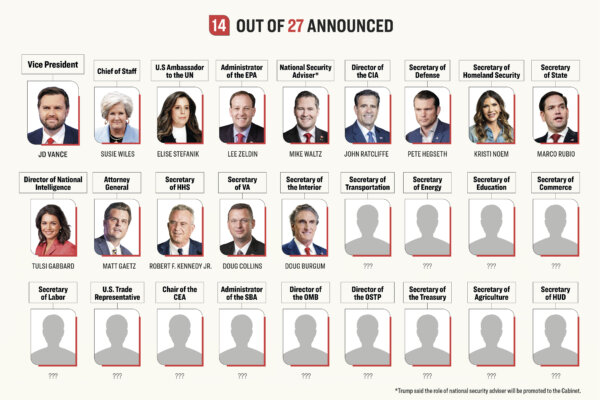| WASHINGTON—Trump’s big week of picks started calm. |
| Names like Mike Waltz (R-Fla.)—tapped on Nov. 12 to serve as Team Trump 2.0’s national security advisor—met with a relatively warm reception from the establishment. |
| “Mike Waltz,” the Economist intoned, “wants America to focus on the threat from China”—a common thread across virtually all of Trump’s choices, controversial or otherwise, alongside a lengthy history of loyalty to the president-elect. |
| Trump’s selection of John Ratcliffe, his former director of national intelligence, to lead the Central Intelligence Agency was received neutrally, at least judging by the headlines on Google News. |
| That Tuesday night pick was lauded by Rep. Mike Turner (R-Ohio), head of the influential House Intelligence Committee. |
| Mid-afternoon the next day, there was another audible sigh of relief from the establishment wing of the Republican Party. Early reporting had proven accurate: Sen. Marco Rubio (R-Fla.), a member of the Senate’s intelligence committee, had been chosen as Trump’s secretary of state. |
| Less than twenty minutes later, there was a collective gasp: Trump had picked former Democrat Tulsi Gabbard as director of national intelligence. |
| Soon afterward came the biggest shock—and likely toughest confirmation—of all. |
| “It is my Great Honor to announce that Congressman Matt Gaetz, of Florida, is hereby nominated to be The Attorney General of the United States,” Trump wrote in his announcement. |
| Gaetz, a man with many enemies and who triggered the ouster of former House Speaker Kevin McCarthy (R-Calif), was the subject of a yearslong House Ethics Committee probe over allegations of sexual misconduct, drug use, misuse of campaign funds, and accepting improper gifts, all of which he has denied. |
| Many have called on the committee to release its report, but Speaker Mike Johnson (R-La.) argued against disclosure after Gaetz resigned from the chamber following the cabinet announcement. The committee does not have jurisdiction over former members. |
| “Matt Gaetz shouldn’t be able to resign away an ethics investigation,” Sen. Dick Durbin (D-Ill.) wrote on X. |
| Early Thursday evening came another highly controversial pick. The president-elect wanted another former Democrat, Robert F. Kennedy, Jr., in his administration. More specifically, he sought to place the vaccine safety advocate, known for claiming that there is a link between certain vaccines and autism, at the helm of the Department of Health and Human Services. |
| The progression could be scored to Edvard Grieg’s “In the Hall of the Mountain King,” the soundtrack to a video Trump famously shared on then-Twitter in 2020 when he was acquitted in the Senate after being impeached in the House. |
| Rep. Frank Pallone (D-N.J.) released a statement describing Kennedy, Jr. as a “known conspiracy theorist.” |
| And neoconservative political insider Bill Kristol suggested that Sens. Lisa Murkowski (R-Alaska), Susan Collins (R-Maine), Mitch McConnell (R-Ky.), and Thom Tillis (R-N.C.) “issue a statement saying they won’t support manifestly unfit nominees like RFK Jr., Gabbard, Gaetz, and [Peter] Hegseth.” |
| The week was also marked by choices that appear to reflect a commitment to experimentation in the new administration—in the language of Silicon Valley, moving fast and breaking things. |
| That, anyway, is one way to interpret the new Department of Government Efficiency, or DOGE, to be co-led by entrepreneurs Vivek Ramaswamy and Elon Musk. |
| Though criticized in some quarters, particularly for possible conflicts of interest related to Musk’s many businesses with government ties, it has also drawn positive interest from a wide array of political figures; everyone from Justin Amash, a former Republican representative known for past opposition to Trump, to Rep. Dean Phillips (D-Minn.), who on X described himself as a “Democrat for government efficiency.” |
| “I kept all the receipts from my “nay” votes on absurd spending bills that passed Congress overwhelmingly and were signed into law,” Amash wrote. |
| North Dakota Gov. Doug Burgum, who, like Musk, got his start in the tech world, will also head up a Trump 2.0 innovation in governance. The billionaire will chair a new National Energy Council, created as a mechanism for coordinating energy policy within an administration that has vowed to expand production and slash costs quickly and across the board. |
| Another theme in Trump’s picks is youth, including when compared to their Biden administration equivalents. |
| The latest pick, prospective press secretary Karoline Leavitt, is just 27. She would replace Karine Jean-Pierre, who is 50. |
| Prospective administration members that have gained traction on social media, like Kash Patel for FBI director or Michael Anton as deputy national security advisor, could also leave many shaken. |
| But the week has also been marked by truly unanticipated choices, like Pete Hegseth for secretary of defense. |
| The latest crescendo Trump orchestrates could shock, or awe, us all. |
| |
| To dig deeper into the subject, read the following original reporting by our journalists: | |
| |
| |
 | | Tracking Every Trump Cabinet Pick | | President-elect Donald Trump is already beginning to finalize his Cabinet roster less than a week after his decisive victory over Vice President Kamala Harris. | | | |
Thank you for being a subscriber
If you enjoy what you’re reading, please consider forwarding this email to someone who might find it informative. Your Feedback
We'd love to hear from you. You can email us at topstory@epochtimes.nyc We may feature an exerpt of your response in the next newsletter.
| | |